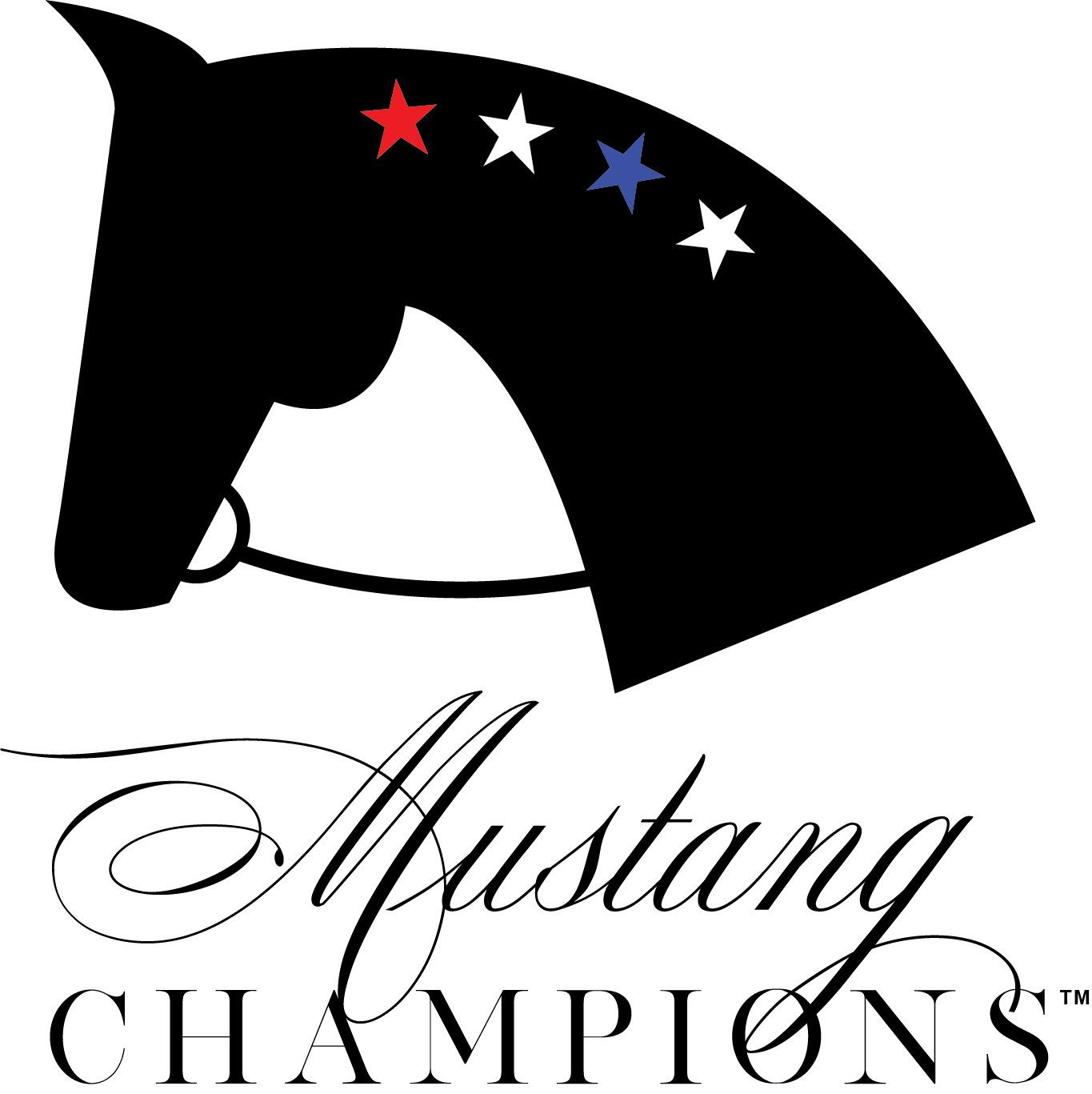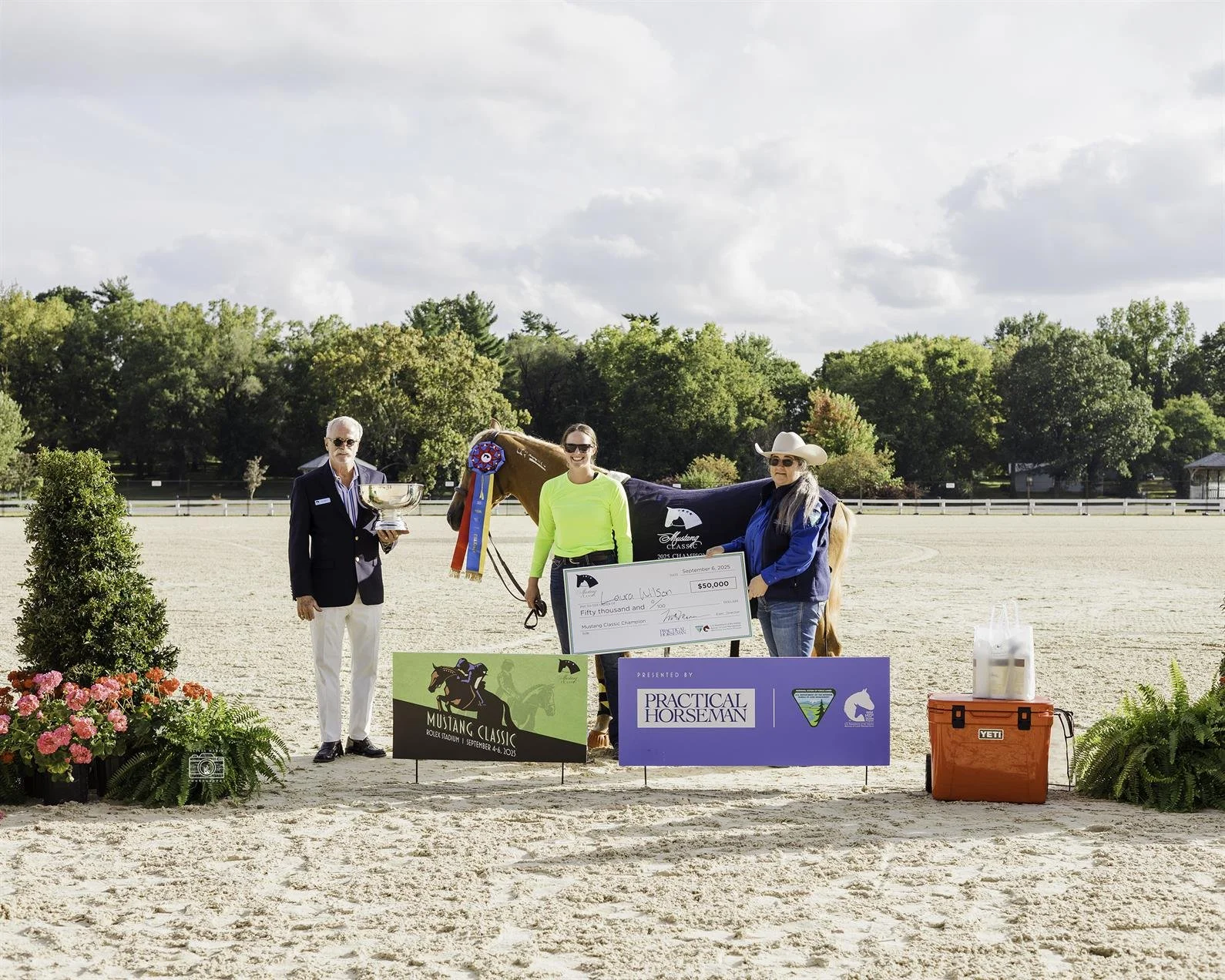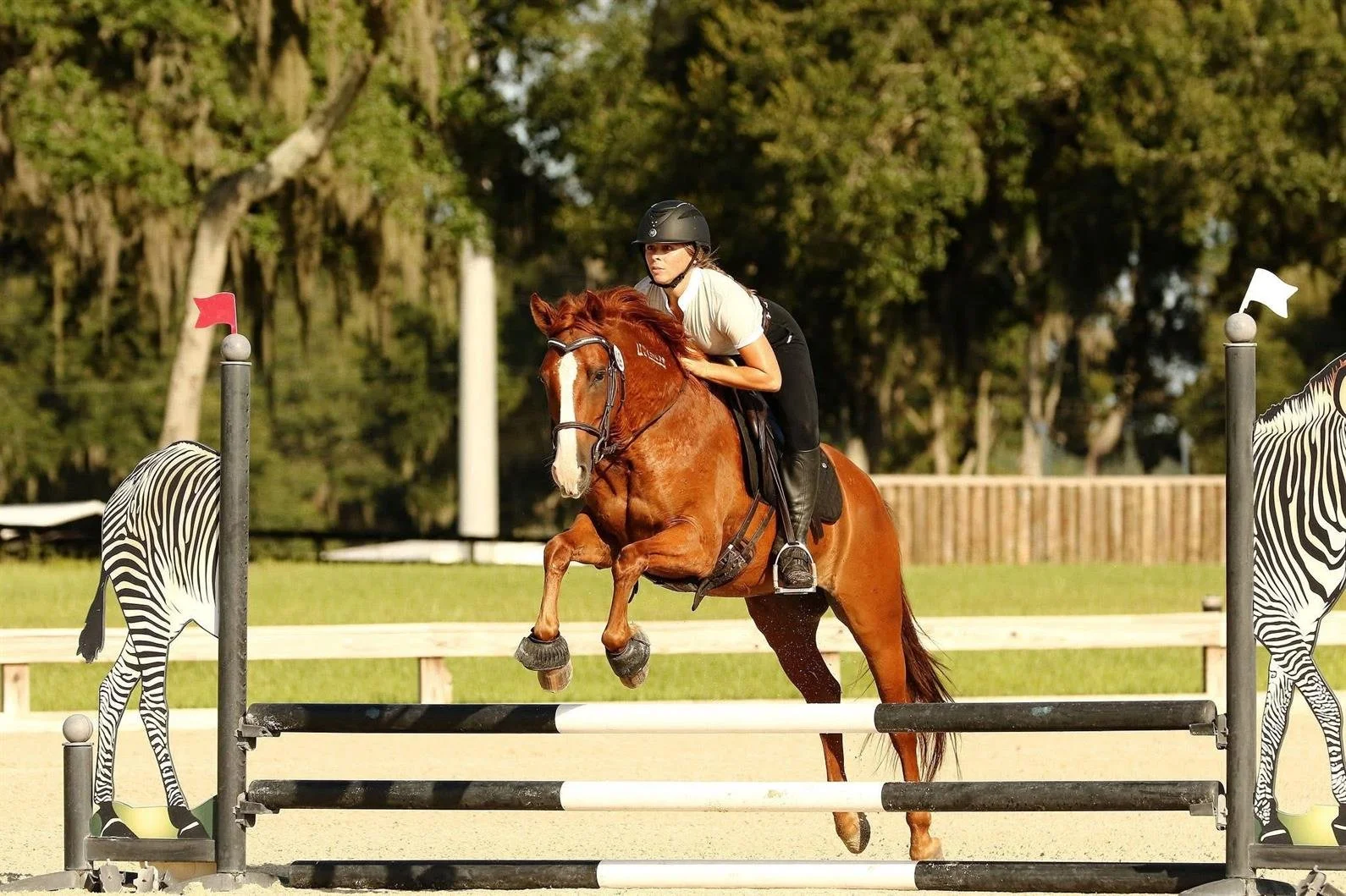“Once You Gain the Trust of a Mustang, You Have a Partner for Life”
The 2025 Mustang Classic held at the Kentucky Horse Park challenged Mustangs to compete in dressage, show jumping, and working equitation.
By US Equestrian | Sep 22, 2025, 2:03 PM
Mustangs are most commonly thought of as Western horses, but the wild breed that is a staple of American culture is incredibly adaptable to any challenges put in front of them.
The 2025 Mustang Classic proved that as Mustangs from around the U.S. gathered at the Kentucky Horse Park in Lexington, Ky. from Sept. 4-6 to compete in three different disciplines: training level dressage, show jumping, and working equitation. Every competitor completed each preliminary phase, then the top performing pairs faced off in the Championship Finals, a freestyle performance to determine the Mustang Classic Champion.
2025 Mustang Classic winners Laura Wilson and One Ear Wonder; photo by Alicia Marie Photography
To be eligible for the Mustang Classic, horses had to be three years of age and older (as of January 2025), adopted or purchased at a BLM Wild Horse and Burro off-range corral or BLM satellite event, and been in training for 100 days to one year.
“It was such an honor to be able to produce the Mustang Classic, and to give people the opportunity to compete in a venue like Rolex Stadium,” said Matt Manroe, Executive Director of the Mustang Classic. “In the Mustang community, everyone helps each other at competitions. The horses tend to cost the same price with minimum bids starting at $125 — although some cost up to $1,000 — so that is a great equalizer, as you can’t have a million-dollar jumper.”
The second annual Mustang Classic was won by Laura Wilson of Forest Hill, Md., on her 5-year-old Twin Peaks Mustang, One Ear Wonder. True to his name, the gelding is missing his left ear, but that didn’t impact his training when Wilson adopted him in November 2024.
Laura Wilson and One Ear Wonder receiving their trophy from Matt Manroe; Alicia Marie Photography.
“I thought with he might be sensitive about it or not want it touched, but he didn't really care,” said Wilson. “He just was a normal Mustang that hadn't been touched.”
After picking him up in January, Wilson spent two weeks in Florida in February with trainer, Marsha Sapp, breaking in Wonder, riding him twice a day.
“He handled it so well and was great,” she said. “He was a little hard with directions at first, but that was just baby horse stuff.”
They began jumping two months later, and although Wonder struggled with the concept at first, after a few weeks break, Wilson took him to a schooling show where he excelled.
“It was like he studied the entire time I was not jumping him,” Wilson marveled. “He was so good.”
Wilson said she was surprised by her victory at the Mustang Classic, especially in the dressage phase, as she expected horse and rider pairs with more experience together to win.
“After I completed my freestyle [in the finals], I felt pretty good. He went in there and did a really great job,” she said. “Over the entire weekend, he really impressed me with his ability to take in a big atmosphere and cope with it well.”
Wilson, who has evented up to the Preliminary level, plans to do eventing and dressage with Wonder in the future, as she said he seemed to really enjoy showing.
Cat Zimmerman with Hot Pocket; photo by Madden Photography .
Cat Zimmerman of Archer, Fla., grew up doing hunter/jumper shows and trained her first Mustang at age 12. She now works with all breeds of horse, but her heart is with Mustangs.
“They teach you something new every single time and they help you reflect on yourself and where you need to meet them,” she said. “It’s been an amazing experience working with them, and they've brought a lot of great things into my life.
Cayla Stone and Phaedra during the dressage phase; Alicia Marie Photography
“I love starting out with them when they're wild and untouched,” continued Zimmerman, who came in ninth overall at the 2025 Mustang Classic on her horse, Hot Pocket. “They don't have someone they can trust and rely on yet. Being that person and being able to support, guide them, and set them up for success later in life is a very special feeling.”
Once you have trained a Mustang, you will have a very loyal partner.
“They really do want to try to do good and I think they find a lot of enjoyment in making the people who are around them happy,” said Zimmerman.
Manroe, who owns two Mustangs, said that working with Mustangs is very different to training domestic horses.
“If you are the person who gentles the Mustang (gets them comfortable with human touch and basic handling), they bond with you differently because of the trust that they must have in you,” he said. “Once they learn something, they retain it,” he added.
Wilson said part of the appeal of Mustangs for her is that they all have their own unique story.
“There is the unknown of what happened to them, how they ended up where they were, and their survival journey,” she explained. “Domesticated horses are pampered from day one, but with Mustangs, it is so cool how fast they come around and learn to love people.”
One Ear Wonder and Laura Wilson had a construction theme for their freestyle; photo by Sam Van Fleet .
Zimmerman pointed out that the little things we don't think about with domestic-bred horses can affect a Mustang when you first work with them. “Even how we step, breathe, or how we move our arms ... they have to learn every aspect of how we handle and act around them because it's a completely new experience,” she said. “They are a blank slate, and going from the wild to captivity is a huge lifestyle change for them.
Samantha Rock, who lives in Brighton, Colo., has been involved with Mustangs since 2015, and said she likes the breed as they are versatile, sturdy, and strong.
“They’re pretty docile for the most part, you don’t get a lot of very hot ones,” said Rock, who was third in this year’s Mustang Classic on Smart Cookie, and sixth on Just Blazin. “The most challenging thing is getting them to learn that you’re not there to hurt them, and you’re not a predator — but once you gain the trust of a Mustang, you have a partner for life.”
Rock does a little bit of everything with her two Mustangs, including eventing, dressage, jumping, and working with cows. “Mustangs are very easy going and just go with the flow, which makes them be able to adapt to different disciplines,” she said.
The Mustang Classic actively promotes compassionate training, and stresses that all Mustangs must be treated with dignity and respect. Exhibitors must complete the Mustang Training Readiness Curriculum, which includes video resources with information on adopting, starting, and training Mustangs. Competitors were also required to take an online training readiness curriculum test.
Samantha Rock and Smart Cookie in the show jumping phase; photo by Sam Van Fleet
For Manroe, Mustangs offer an accessible path into horse ownership without the prohibitive costs often associated with it.
“This is an opportunity for people to have a horse and be able to compete with it,” he said. “But if someone is interested in competing, I would recommend finding a trainer to work with for the gentling stage, then you have a green horse to take to competitions. We want more Mustangs to be seen out there in the world.”
Many Mustangs are purchased through online auctions hosted by the Bureau of Land Management (BLM) Wild Horse and Burro Program. If you do purchase a formerly wild horse, Zimmerman advises researching trainers in your area with Mustang experience.
“There are some phenomenal Mustang trainers all over the country,” she said. “I feel like Mustang people as a whole are very welcoming and want to support each other, and they want to teach more people about the breed.”
Rock also suggests working with a trainer who has prior Mustang experience as it differs from training a young, domesticated horse.
“There will be times when Mustangs are great and easy to train, but then you might run into a problem that you’ve never encountered before,” she said.
To learn more about the Mustang Classic, please visit mustangclassic25.com. If you are interested in adopting a Mustang or want to learn more about the BLM’s Wild Horse and Burro Program, which aims to manage and protect herds, go to blm.gov/whb.






